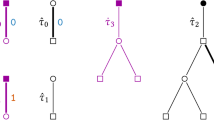Abstract
Existing random models for the constraint satisfaction problem (CSP) all require an extremely low constraint tightness in order to have non-trivial threshold behaviors and guaranteed hard instances at the threshold. We study the possibility of designing random CSP models that have interesting threshold and typical-case complexity behaviors while at the same time, allow a much higher constraint tightness. We show that random CSP models that enforce the constraint consistency have guaranteed exponential resolution complexity without putting much restriction on the constraint tightness. A new random CSP model is proposed to generate random CSPs with a high tightness whose instances are always consistent. Initial experimental results are also reported to illustrate the sensitivity of instance hardness to the constraint tightness in classical CSP models and to evaluate the proposed new random CSP model.
Access this chapter
Tax calculation will be finalised at checkout
Purchases are for personal use only
Preview
Unable to display preview. Download preview PDF.
Similar content being viewed by others
References
Achlioptas, D., Kirousis, L.M., Kranakis, E., Krizanc, D., Molloy, M., Stamation, Y.C.: Random constraint satisfaction: A more accurate picture. In: Smolka, G. (ed.) CP 1997. LNCS, vol. 1330, pp. 107–120. Springer, Heidelberg (1997)
Gent, I., MacIntyre, E., Prosser, P., Smith, B., Walsh, T.: Random constraint satisfaction: Flaws and structure. Constraints 6, 345–372 (2001)
Gao, Y., Culberson, J.: Resolution complexity of random constraint satisfaction problems: Another half of the story. In: LICS 2003 Workshop on Typical Case Complexity and Phase Transitions (2003)
Molloy, M., Salavatipour, M.: The resolution complexity of random constraint satisfaction problems. In: Proceedings of FOCS 2003 (2003)
Xu, K., Li, W.: Exact phase transitions in random constraint satisfaction problems. Journal of Artificial Intelligence Research 12, 93–103 (2000)
Smith, B.M.: Constructing an asymptotic phase transition in random binary constraint satisfaction problems. Theoretical Computer Science 265, 265–283 (2001)
Chvatal, V., Szemeredi, E.: Many hard examples for resolution. Journal of the Association for Computing Machinery 35, 759–768 (1988)
Beame, P., Karp, R.M., Pitassi, T., Saks, M.E.: On the complexity of unsatisfiability proofs for random k -CNF formulas. In: ACM Symposium on Theory of Computing, pp. 561–571 (1998)
Achlioptas, D., Beame, P., Molloy, M.: A sharp threshold in proof complexity. In: ACM Symposium on Theory of Computing, pp. 337–346 (2001)
Mitchell, D.: Resolution complexity of random constraints. In: Van Hentenryck, P. (ed.) CP 2002. LNCS, vol. 2470, pp. 295–309. Springer, Heidelberg (2002)
Beame, P., Culberson, J., Mitchell, D., Moore, C.: The resolution complexity of random graph k-colorability. Electronic Colloquium on Computational Complexity, TR04-012 (2004)
Zhang, L., Madigan, C., Moskewicz, M., Malik, S.: Efficient conflict driven learning in a boolean satisfiability solver. In: Proceedings of International Conference on Computer Aided Design, ICCAD 2001 (2001)
Mitchell, D.G.: The Resolution Complexity of Constraint Satisfaction. PhD thesis, Department of Computer Science, University of Toronto, Canada (2002)
Gao, Y., Culberson, J.: Consistency and random constraint satisfaction models. Technical Report TR04-13, Department of Computing Science, University of Alberta (2004)
Ben-Sasson, E., Wigderson, A.: Short proofs are narrow - resolution made simple. Journal of ACM 49 (2001)
Author information
Authors and Affiliations
Editor information
Editors and Affiliations
Rights and permissions
Copyright information
© 2004 Springer-Verlag Berlin Heidelberg
About this paper
Cite this paper
Gao, Y., Culberson, J. (2004). Consistency and Random Constraint Satisfaction Models with a High Constraint Tightness. In: Wallace, M. (eds) Principles and Practice of Constraint Programming – CP 2004. CP 2004. Lecture Notes in Computer Science, vol 3258. Springer, Berlin, Heidelberg. https://doi.org/10.1007/978-3-540-30201-8_5
Download citation
DOI: https://doi.org/10.1007/978-3-540-30201-8_5
Publisher Name: Springer, Berlin, Heidelberg
Print ISBN: 978-3-540-23241-4
Online ISBN: 978-3-540-30201-8
eBook Packages: Springer Book Archive




